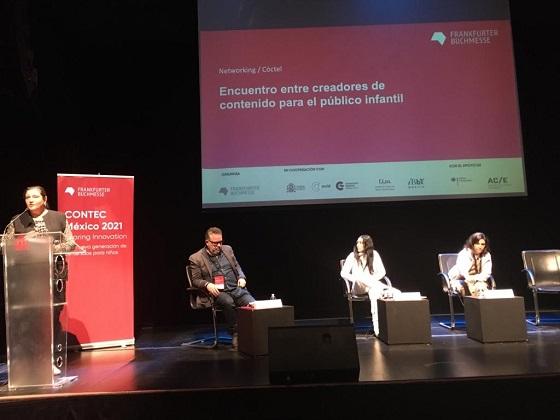Interview with Fernando Moreno about his participation at CONTEC México 2021
"Stories are everything"
Fernando Moreno holds a BA and MA in Communication from Iberoamericana University. Since 2002, he has been a full-time academic and coordinator for Advertising at the Faculty of Communication of the Iberoamericana University. He has been a professor at the same university since 1994, teaching various subjects such as film language and film production. He is a regular contributor to the radio station Ibero 90.9 and has directed and hosted the programme "El Cine y..." for more than 12 years.
In our interview he talks about his learnings at CONTEC México and what he wishes for the creative sector in Mexico.
You hosted the two Round Tables by Frankfurter Buchmesse at the CONTEC MEXICO event this year and talked to creatives about innovations and the relationship between book and animation – among other topics. What insights have you gained?
The first conclusion I came to after the round tables and participating in an event like CONTEC México is that, having so many connections and points of contact between the different cultural industries in our country, in this case between the literary and children's book and audiovisual industries, there is still a lot to be done in so many areas.
After listening to the other participants, I concluded that the relation between the different industries is not the exclusive one-way street from print towards digital, as we are normally led to believe, but should rather be seen as a mutual exchange where all parties can benefit.
Another important take-away for me was about the importance multi-disciplinarity, and not just regarding the formation of working teams or creative partnerships. It is also vital for the development processes and the roles of those who shared their experience and projects with us. Just to illustrate my point – speakers told us that in their work they have done cultural management, research for the development of exhibitions, curatorship, writing, illustration, scriptwriting, production, animation and even promotion of editorial and audiovisual content of their authorship.
How important are stories and books for the creative industry?
Stories are everything, both for the book industry and other creative industries. Without stories there is no book to be published, no product to be developed. Stories are, without the shadow of a doubt, the starting point of anything that can be shared via all the different media or platforms. So, in that sense, without the story, its characters and narrative, the idea of crossmedial exchange is impossible.
Which role can Frankfurter Buchmesse play in this creative sector for Mexico? Film is one of the central themes of THE ARTS+, how could you imagine a presence of film festivals such as Guadalajara, Oaxaca, Monterrey, and others within the framework of THE ARTS+ at Frankfurter Buchmesse?
Perhaps the idea may sound far-fetched but, besides thinking of presenting or making visible literary or graphic works that can be adapted to audiovisual media we should explore the idea of organising events where writers can present works already adapted for the cinematographic medium.
There are many examples in Mexico where the work of popular and renowned authors such as Ángeles Mastretta, Laura Esquivel, Jorge Ibargüengoitia, Guillermo Arrriaga or Xavier Veslaco was adapted for another medium. Ricardo Cucamonga's Cindy la Regia or Jis and Trino El Santos’ contra tetona Mendoza were successfully adapted for audio-visual.
Three years ago, the South African Nobel laureate J.M. Coetze attended the Morelia Film Festival for the Mexican premiere of the Colombian Ciro Guerra's film Waiting for the Barbarians, which is based on his novel; the movie was very well received. With the author present, the film premiere had a very special feel as it showed very clearly all that literature has given to cinema – which is also evident in all the other successful film adaptations of novels.
So, I would encourage you to organise movie screenings of the most recent and most successful novel adaptations at book fairs or inviting literary celebrities to screenings at film festivals.
Beside CANACINE for film, how is the creative industry organized in Mexico, is there an overarching association or something similar, and what are the most important events for the creative industry?
Unfortunately, the way in which the cultural industries in Mexico are articulated and organized is, to say the least, still in its early stages and limited in scope.
As for cinema itself, there are several efforts that, while well-intentioned, do not strengthen the visibility of the medium because they serve different goals and interests.
After a little more than two decades of sustained growth of the film industry thanks to public policies that maintained continuity regardless of the ruling party, support, funding, and tax incentives for production were interrupted when the new regime arrived.
Today, efforts in the cinematographic field seem isolated and what the IMCINE (Mexican Institute of Cinematography) is doing goes in a different direction than what the CANACINE (National Chamber of the Cinematographic Industry) or the AMAC (Mexican Academy of Cinematographic Arts and Sciences) are proposing.
AMAC is undoubtedly the organisation with the highest standing and prestige of the medium in the country, around which the film community has grouped to address the recent crises in the sector.
This ranges from opposition to and criticism of the current federal government's cuts to the cultural budget, to the distribution of emergency funds that companies like Netflix have contributed to support the hardest hit workers in the sector who were left without income during the pandemic.

